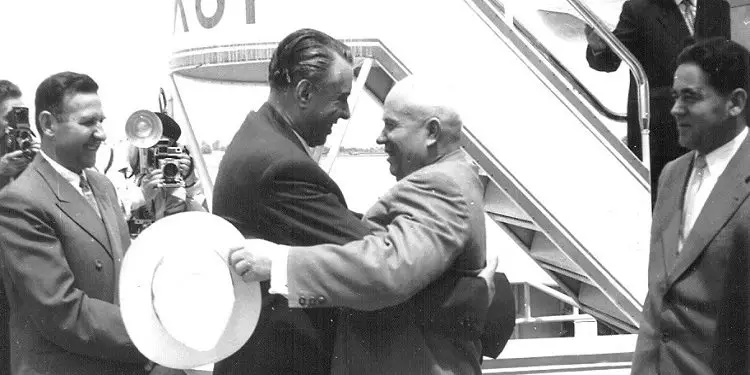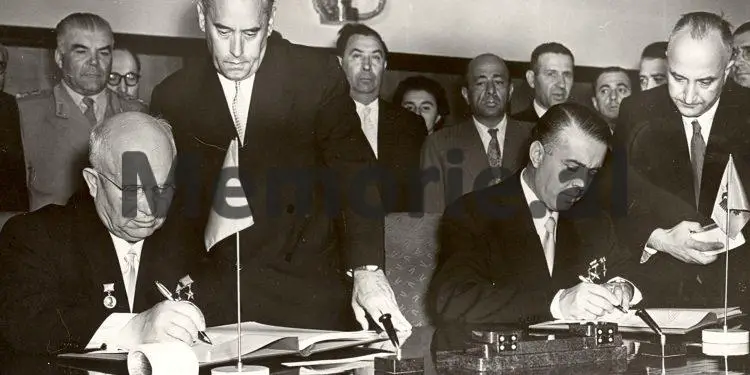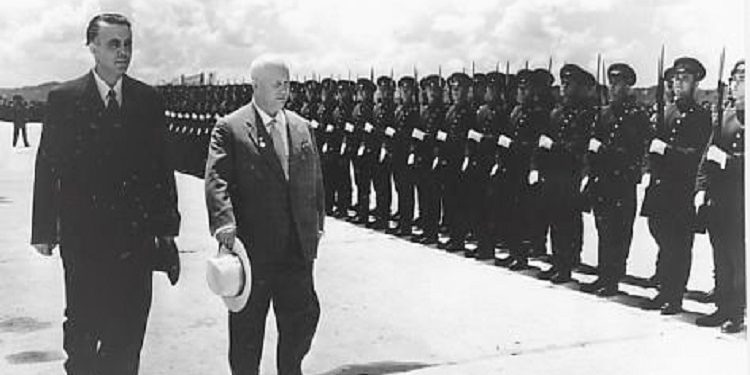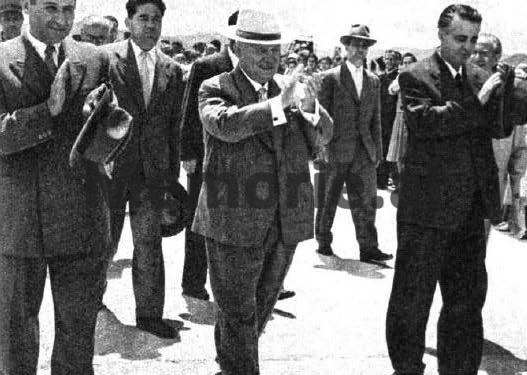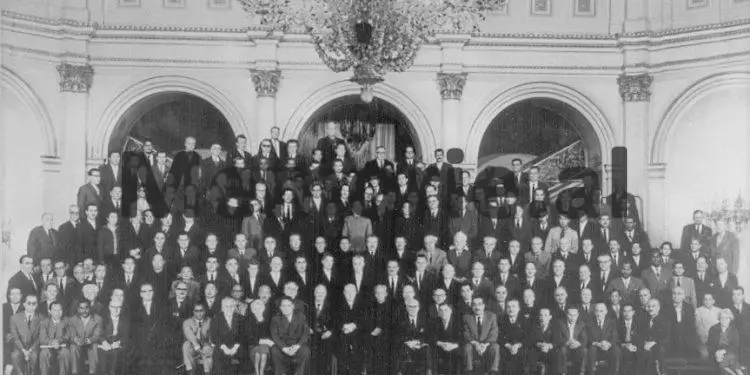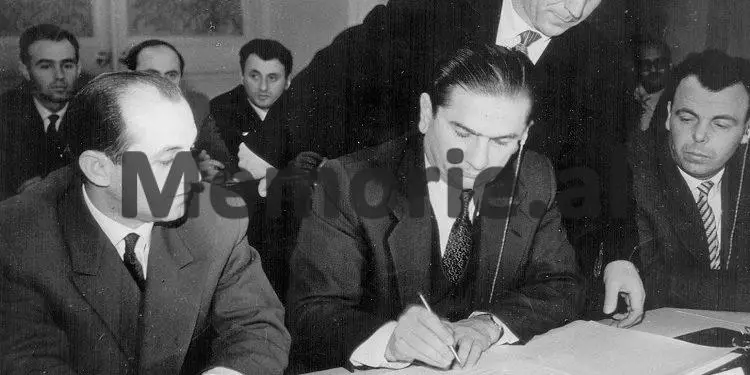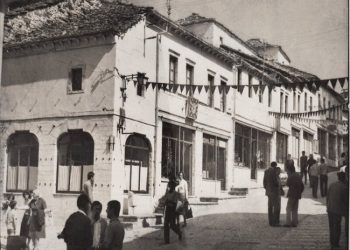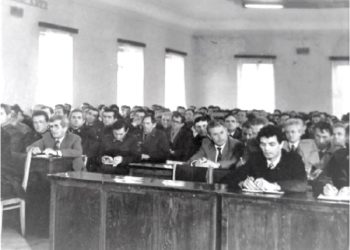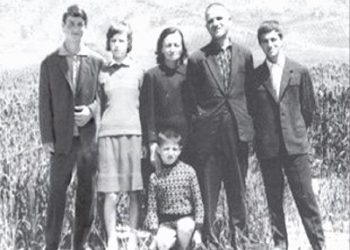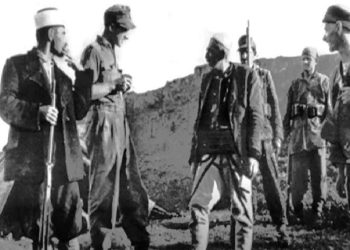By Armand Jonuzi
Part One
Memorie.al / Relations between Albania and the Soviet Union were becoming increasingly icy. It was 1960, and the clashes between the leaders of the communist parties of the two countries were increasing. There were several moments on the eve of the Moscow meeting, with historical significance. On November 8, the leadership of the Communist Party of the Soviet Union distributed to all delegations, including the delegation of the PLA, a long letter that the Central Committee of the Communist Party of the Soviet Union addressed to the Central Committee of the Communist Party of China. In this letter, the Soviets listed all the criticisms, accusations, and remarks that the Communist Party of the Soviet Union had about the leadership of the Communist Party of China.
In that letter, the PLA was not directly attacked, but in one place all the socialist countries were listed and only Albania was missing, so it did not appear as a socialist country. During this time, several meetings of the ALP delegation with the Soviet leadership took place. Specifically, on November 8, Andropov, who at that time was the head of the Foreign Directorate of the Central Committee of the Communist Party of the Soviet Union for relations with socialist countries, went to the villa where the ALP delegation was located and requested a meeting with Enver Hoxha.
Andropov came to announce the meeting that the leadership of the Communist Party of the Soviet Union requested to be held between the ALP delegation and Nikita Khrushchev, to discuss the problems of relations between the two parties. Enver Hoxha, who refused the invitation, said: “I had decided to hold the meeting. But when I became aware of the letter you distributed to the parties, including our party, on November 8, where Albania was not listed as a socialist country, I could not accept the invitation in any way, because this is blackmail that we can exclude you from the socialist camp”.
Andropov tried to justify himself, saying that this letter had nothing to do with the Albanian People’s Party, but Enver Hoxha insisted on his position. However, after this, on November 10, a meeting of the delegation with part of the Soviet leadership took place, where Mikoyan, Kozlov, Suslov, Pospelov and Andropov were present. The aim was, at least as our delegation interpreted it, to coerce the ALP delegation not to raise at the meeting, that is, in the speech that Enver Hoxha was going to give, the divergences and complaints that the ALP had in its relations with the leadership of the Communist Party of the Soviet Union, and to side with the Soviet leadership. But, as things had gone, nothing was agreed upon at this meeting.
Enver-Andropov conversation in Moscow, November 8, 1960
ENVER HOXHA: Today I was informed that Khrushchev has expressed his desire to meet with me tomorrow at 11:00. I had decided to respond positively to this request, but today I read the Soviet material, in which Albania does not appear as a socialist country.
YURI ANDROPOV: What material is this, I don’t understand you; tell me specifically which material you have in mind, where is this said?!
ENVER HOXHA: This is the material of the Communist Party of the Soviet Union, addressed to the Communist Party of China (This is the 125-page letter that the Central Committee of the Communist Party of the Soviet Union addressed on November 5, 1960, to the Central Committee of the Communist Party of China, in which the Central Committee of the Communist Party of the Soviet Union, in addition to the accusations against the Communist Party of China, ignored the existence of the People’s Republic of Albania as a socialist country and denigrated the Party of Labor of Albania).
YURI ANDROPOV: So what does this have to do with it, it is a letter to China, what connection does China have with Albania?
ENVER HOXHA: And this finally cut off the paths of my meeting with Khrushchev.
YURI ANDROPOV: I don’t understand you, what is said in that material about you?
ENVER HOXHA: Read it and you will see.
YURI ANDROPOV: I have read and know that material very well, since I myself participated in its elaboration. But your statement, comrade Enver, is a very serious statement.
ENVER HOXHA: Yes, serious. You are telling Khrushchev that whether or not Albania will be a socialist country is not decided by Khrushchev, this has been decided by the Albanian people themselves with their wars, with their blood. This has been decided by the Party of Labor of Albania, which has walked and will walk on the Marxist-Leninist path.
YURI ANDROPOV: I don’t understand you, comrade Enver that is a material about China; this has nothing to do with Albania.
ENVER HOXHA: I am speaking about my homeland, about my people, about my country.
YURI ANDROPOV: This is a very serious statement and for this I can only express regret.
ENVER HOXHA: We will have a meeting of the parties; there our Party will express its opinion. That’s it, goodbye!
Conversation of the delegation of the ALP with representatives of the Communist Party of the Soviet Union, Mikoyan, Kozlov, Suslov, Pospelov, Andropov
Moscow, November 10, 1960
This meeting with the delegation of the ALP, which was in Moscow to participate in the famous meeting of 81 parties, was requested by the Soviet leaders, in order to convince the delegation headed by Enver Hoxha, not to raise at the meeting of 81 parties the issues on which the ALP did not agree with them, especially with their actions towards our country after the Bucharest Meeting.
The first to speak was Mikoyan, who, expressing regret for the disagreements that had arisen between the Communist Party of the Soviet Union and the Albanian People’s Party, accused the latter of being the cause of the disagreements, since he no longer had the same trust in the Communist Party of the Soviet Union that he had previously had. These statements came after the Russians’ claims that our officers had not behaved well with the Soviet officers at the naval base in Vlora, and therefore the Soviets wondered if Albania wanted to leave the Warsaw Pact. It was also said that the Soviet leadership wanted to resolve these misunderstandings in a fair way. Mikoyan asked Hoxha to tell him where the Soviets had made mistakes and that this made them unhappy and that this happened when the Albanians talked behind your back.
ENVER HOXHA: Tell us when and where we have talked behind your back against you? We Albanians have a habit of never talking behind each other’s backs. Regarding the Vlora military base, what you said is not true. There is a close friendship between the Soviet and Albanian sailors and officers there. This was the case until the Bucharest Meeting, and on our part, it continues to be the case even now. The Central Committee of our Party has given instructions to our people to maintain a correct attitude towards the Soviet people at the base. But some of your sailors have even hit our sailors.
The Ministry of Defense of the People’s Republic of Albania has instructed that these things be regulated through the basic organizations of the Party. Something happened to one of our naval officers and a Soviet rear admiral, who had come from Sevastopol for inspection, who had a habit of drinking. He unfairly captured one of our officers, a good comrade who had studied in the Soviet Union, and asked him to tell him what was decided at the Plenum of the Central Committee, because he said that he would give lectures on this in Sevastopol, because they would ask him there. Our officer replied that the communiqué of the Plenum of the Central Committee had been published in the newspaper “Voice of the People” on September 9, 1960.
Then our officer reported to his commander. Your comrades turned their ears against the admiral, he apologized and everything was settled. Regarding the acceptance of the submarines, our servicemen studied and prepared for 2 and a half years in Sevastopol, distinguished themselves in shooting. Our headquarters and sailors were prepared to solemnly receive the submarines. There is a Soviet rear admiral in our headquarters, we do not know what he is, but he is not a rear admiral. He said that the submarines cannot be handed over to you, because we are supposedly not prepared. The comrades from the Ministry of Defense replied that, how is such a thing possible, if it takes our military personnel several more months to learn, you can tell us. But the Soviet headquarters itself said that the Albanian crews are prepared.
We were then told that winter had come, the sea had big waves, our comrades came here to your Admiralty, they raised the problem and received the answer that the submarines would be handed over to you. But, again, an order came from your people, not to give them to us. When we were in Tirana, our Ministry of Defense wrote a letter to Gorshkov, explained the matter socially, just as I described to you. The letter says that, if it takes several more months to prepare our military personnel, you can tell us. But that is not the reason.
MIKOJANI: But where is the reason?
ENVER HOXHA: You should tell us that. But that is not the main issue. Let us now come to the issue of leaving the Warsaw Pact, since you spoke about that at the beginning.
MIKOJANI: No, but the impression is created.
ENVER HOXHA: How is the impression created, based on the data of a certain rear admiral?! Let’s look at this issue that there are more serious things.
MIKOJANI: Right?! We don’t know anything.
ENVER HOXHA: How do you not know? If that is so, it is not good that your Central Committee is not aware. Do you know that they have threatened to exclude us from the Warsaw Pact? Grechko did this.
MIKOJANI: We don’t know anything, you tell us.
ENVER HOXHA: We will tell you, and forcefully, that it is a matter of principle. Your two marshals, Malinovski and Grechko, have said such a thing. You should know.
HYSNI KAPO: On October 22, I told this to Polyanski.
MIKOJANI: You may not believe me, but I don’t know.
ENVER HOXHA: If you put the matter this way, that you know nothing, we must remind you that four months ago, we wrote to you about the ambassador. Why didn’t you use the Leninist practice of your party and answer us?
KOZLOVI: We will send you another ambassador.
ENVER HOXHA: Now you say that, but why didn’t you write to us? We wrote to you 4 months ago, but we didn’t receive an answer.
MIKOJANI: We did well not to answer you, because for 15 years our ambassadors have been going to the party committees and asking questions, and this has been the case in Albania as well. Is it interference on the part of our ambassador to ask the chairman of the Revision Commission what happened at the Plenum?
ENVER HOXHA: It is interference and it is completely impermissible. I can say that in our country there was nothing secret for the Soviet people. For 16 years we have been following the practice of informing you about important decisions and documents of the Central Committee of our Party or the government.
Why did we do this? Because we have been honest, straightforward with the Soviet Union and its Communist Party. You have no right to accuse our Party of behaving badly towards the Communist Party of the Soviet Union. We have been very close to our Soviet comrades, from the ambassador to the simplest specialist. All doors were open to them.
MIKOJANI, SUSLOV: That’s right.
ENVER HOXHA: We think that there cannot be any other party that has behaved in this way towards the Communist Party of the Soviet Union. Why did we do this? Because we considered the Communist Party of the Soviet Union to be the party that, under the leadership of Lenin, made the Great Socialist Revolution and first paved the way towards socialism and communism.
Before Bucharest we had disagreements, we will say them, for example, regarding Yugoslav revisionism. But we acted in such a way that nothing was understood outside. Why did relations break down after Bucharest? What did we say in Bucharest? We expressed our position by saying that the disagreements that were put forward at the Bucharest Meeting by Khrushchev are disagreements that arose between the Communist Party of the Soviet Union and the Communist Party of China and that the Party of Labor of Albania reserves the right to express its opinion on these at the Moscow Meeting. So why was our Party attacked?
We do not agree with Bucharest, but we did not do anything that would change your attitude towards us one hundred percent. First of all, your ambassador behaved in a vile manner. We loved him. After Bucharest and especially after his return from Moscow, he began to attack us and behaved with contempt towards us. Memorie.al




